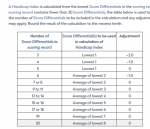Swango1980
Well-known member
I can see that issue, although calculating 95% of a decimal is a bit more tricky to do in ones head, definitely need an app or calculator for that. Just a bit of a pain, especially if you are having a knock with mates and not relying in the computer doing everything for you.I would like to see Eng, Ire and Wales adopt the Scottish system of not rounding CH when making the PH calculation as this avoids the disproportionate "lump" of players off 10 in individual strokeplay.
The new system is very complicated for most and far too complicated for some, but will become far less so with time as we learn by using it.
I'd like to see the 95% (or 93%) embedded within the course handicap. Leave it at that for singles stroke play and match play, 90% for fourball matchplay. Ultimately, you are pretty much back to using 100% course handicap for most rounds most golfers play, 90% for doubles, and a lot more familiar and easy to follow, like pre WHS.
